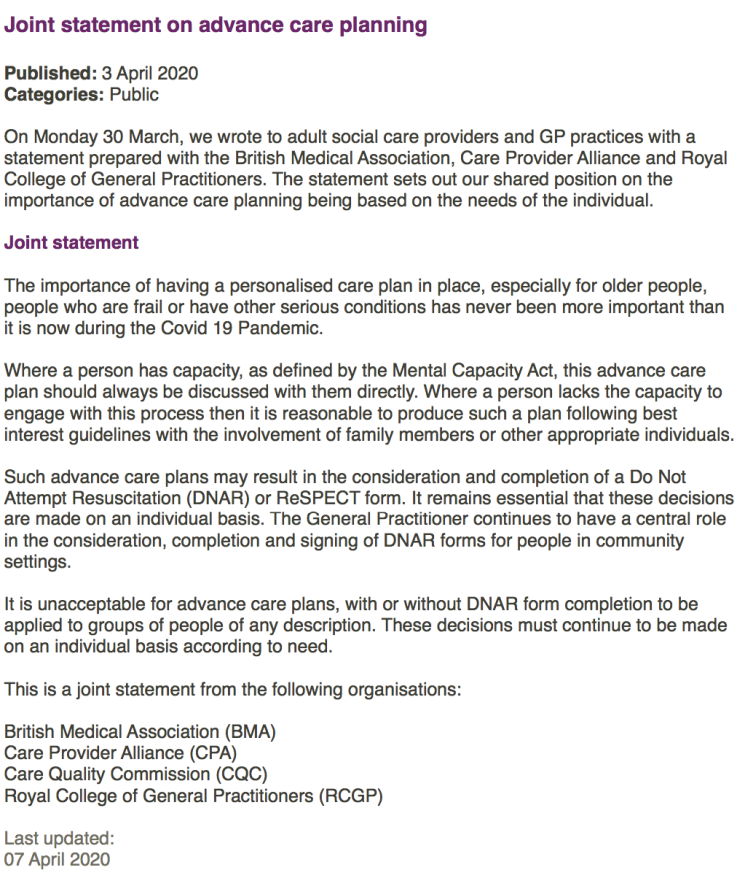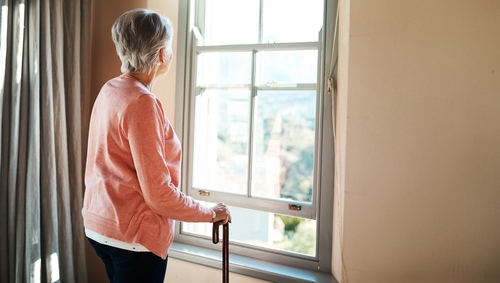An article by Daphne Havercroft. In 2015 Daphne retired from a career as a senior project and service delivery manager for a global IT services corporation. She has seen and experienced the very best of NHS care, delivered by skilled and caring health professionals, and also the worst of the NHS, particularly its leaders’ callous attitude towards the elderly, which has been exposed for all to see during Covid-19. Her Twitter account is @DaphneHavercro1, and her blog can be found here.
The Office of the Public Guardian says that:
A lasting power of attorney (LPA) is a legal document that lets you (the ‘donor’) appoint one or more people (known as ‘attorneys’) to help you make decisions or to make decisions on your behalf. This gives you more control over what happens to you if you have an accident or an illness and cannot make your own decisions (you ‘lack mental capacity’).
Therefore it follows that having an LPA should give people more control about what happens to them if there is a virus pandemic, such as Covid-19.
But does it?
It depends on whether attorneys understand their legal obligations and powers and, most importantly, whether they are prepared to act upon them in the best interests of the people who appointed them.
On 3rd April 2020, the Care Quality Commission published this:

This statement seems to have been mostly ignored because we have seen reports alleging that care home residents have been subjected to blanket DNAR (do not attempt resuscitation) orders, and family members have spoken about care homes blocking them from visiting and supporting distressed, vulnerable relatives.
The second paragraph of the joint statement stresses the importance of having a personalised advance care plan. It slyly refers to the possible involvement of ‘other appropriate individuals’ without being clear that this means attorneys appointed under LPA. Attorneys can be solicitors, but in many cases they are family members and their legal powers are the same as a solicitor who is appointed attorney under LPA.
Attorneys can only make best interest decisions on behalf of a donor if the donor lacks the mental capacity to make a specific decision at a particular time. One of the conditions that can affect a person’s mental capacity is dementia. It is known that dementia increases the risk of serious illness and death for a patient exposed to Covid-19. [Hector: Or at least to lockdown conditions.]
Therefore when a person with dementia has an LPA, it is essential that their attorneys assert themselves to ensure that they are supported to make an advance care plan which reflects their wishes about how they want to be cared for, including decisions about resuscitation, family visits and whether they would want to be admitted to hospital if they were taken ill with Covid-19 or other potentially life threatening illness.
Time is running out. Matt Hancock is threatening the population with a ‘second wave’. Attorneys, don’t let your relative’s right to control what happens to them be swept away by it.
Update: Apologies for the lack of posting in the last few days, basically it’s been a storm over on Twitter recently and I have been glued to the keyboard for 18 hours a day battling it out over there. Spending some more time here from tomorrow, though (it is a vastly more civilised place here).

6 thoughts on “Daphne Havercroft: Covid-19: Where are the attorneys?”
Serious question: have you ever changed someone’s mind on Twitter?
Sorry not a comment on a good article.
How do people feel about waking up to find you live in a police/fascist/tyrannical ( you pick the description) state?
The individual has to take responsibility for herself. One feisty old lady went downtown to a somewhat raunchy tattoo parlor, took off her blouse, and had “DO NOT RESUSCITATE” tattooed indelibly on her chest exactly where a paramedic would start doing chest compressions.
Daphne
Thank you. Forwarded to peeps with LPA Power
@JimW
I’m appalled and furious
Littlejohn today spot on
https://www.dailymail.co.uk/debate/article-8720329/RICHARD-LITTLEJOHN-Heir-Churchill-No-Boris-Johnson-Second-Coming-Warden-Hodges.html
Also
Julia Hartley-Brewer clashes with Matt Hancock over new coronavirus crackdown
https://youtu.be/MlBGUye0xao?t=151
This virus doesn’t ‘shoot up’….Lockdowns did nothing
This man is clearly out of his depth and more than slightly insane. Nobody believes this guy and these lies. The numbers are only spiking in his imagination.
Pubs – you don’t like pubs because people critique the actions of government.
A man with a backbone speaking the truth
Nigel Farage: “We can’t close the whole country down to protect those that maybe at risk. I fear that these restrictions are the beginning of another lockdown. That would be a disaster”
https://www.youtube.com/watch?v=n3LNpCXTB1M
What happens when there’s more than 6 illegal immigrants on the boats? Will plod be handing out fines?
@Gavin
Oldies having DNR tattoo is not unusual
@Nikolai Vladivostock
**Serious question: have you ever changed someone’s mind on Twitter?**
Just read excellent blog post on WEIRD which you can access clicking on ‘Nikolai Vladivostock’
For those, like me, unfamiliar with the acronym it stands for Western, educated, industrialized, rich and democratic: combined attributes which are supposed to distinguish the West from the Rest. Which is well explained on the blog.
What’s written there reminded me of this line from Rene Girard:
‘Not only is the revolt against ethnocentrism an invention of the West, it cannot be found outside the West’.
Girard also offers some clues to the question of “changing minds”. Think about it, a few years ago homosexuality was taboo, everyone smoked, drank and drove, and wore mullet hairstyles.
Now everyone’s mind has not only ‘changed’ but what was once habit now verges on taboo, and what was once taboo it is now taboo to oppose; and no one could or would sport a mullet other than as a ‘joke’.
There could be no reason for it other than “imitation”, what Girard calls “mimetic desire”: that fashion or ‘opinion’ is mimetic, i.e. more or less unconsciously ‘copied’ from others. For Girard our cherished individual autonomy is false.
Indeed it’s impossible to be non-mimetic: nothing is more mimetic or conformist than being anti-mimetic / non-conformist, like punk rockers or their hippy predecessors against whose cliched uniformity they imagined themselves in revolt: instead of long hair and loons, a uniform of spiky hair and safety pins signalled defiance of social norms….
None of that negates individual agency. But if you did ask the barber for a mullet or decided to dress like an 18th century nobleman, it would be clear to everyone that your appearance was just as ‘mimetically’ determined by the crowd as anyone else’s if not more so.
At the same time the pressure of the crowd can be irresistible as when Peter betrayed Jesus. When Jesus said “Forgive them father, for they know not what they do”, he’s referring to the mob contagion, the primal desire for unanimity, to join in and belong rather than to be left out.
Girard interprets the Bible anthropologically, after Simone Weil for whom the Gospels are first anthrop-ology theory of man, and second the-ology theory of God.
For Girard desire is always triangular based on ‘models’. He distinguishes ‘desire’ from appetite which can be individual: if I’m hungry I just want food. Even so my choice could still be driven by others, i.e. mimetic. That’s the premise of pretty much all marketing relating to food and dining. But it could be just seeing someone else’s food or hearing of those ‘delicious strawberries’.
We imagine our choices as self-determined but we’re all doing the same. Consumer marketing relies more on specific ‘models’ than the crowd as such, i.e. characters who appear to possess some desirable quality we feel to be deficient in ourselves. As if our association with the brand / product will fill our lack.
Again we’d each of us deny falling for something so ridiculous. Our bank balances tell another story.
Re Twitter, it’s more the volume of opinion that ‘changes minds’. The crowd contagion is no different in principle even if it’s from behind a keyboard. Presumably that’s the justification for bot farms. That’s the premise of most political marketing: *they* are voting for *us*: you *don’t* want to be one of *them*
Remarkable how Girard’s mimetic theory which dates back to the 60s anticipates social media, where rivalry and desire are laid bare, giving the lie to economic rationalism whether of ‘socialist’ ‘left’ or ‘libertarian’ ‘right’.
People slaughter each other on social media where nothing material is at stake at all. The desire to ‘win’ has no material basis. Even the currency of likes or retweets are economically meaningless unless using Twitter to some commercial end.
A telling example Girard often refers to is that if you put X number of children in a room with the same number of identical toys, as soon as one child reaches for a toy another will contend for it.
‘Toy’ here could symbolise *any* rivalry. whether the object of desire is a woman or leadership of the Labour party our fiercest rivals are always those closest to us, who therefore become our “obstacles”. Even the prestige of ‘winning’ on Twitter or at least to have the last word has to be resisted. It’s too ridiculous for words as are most squabbles in daily life. At least in retrospect…
Comments are closed.